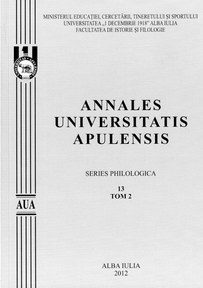VINTILĂ HORIA, NICOLAE STEINHARDT – PARADOXUL CREATOR
Vintilă Horia, Nicolae Steinhardt – The Creative Paradox
Author(s): Lavinia GeambeiSubject(s): Literary Texts
Published by: Universitatea »1 Decembrie 1918« Alba Iulia
Keywords: exile; imprisonment; paradox; freedom; self-knowledge
Summary/Abstract: Totalitarian regimes have been the epical material of many narrative texts, the substance of lyrical texts, the implicit and explicit subject of dramatic texts, beyond the horrors, injustices and absurdities attempting to individual freedom and installation of fear. Political detention or exile is an extreme form of manifestation of the totalitarian regime, anywhere and anytime. Following fierce and lengthy experience of political detention in communism, the Romanian literature has developed a separate chapter called detention literature, representing one of the most significant aspects of contemporary Romanian literature. It can be added to the literature of exile. Both components are part of controversy and hesitation, however, read unbiased and beyond political implication, they remain a major fact that forgetting will not be able to enclose. Paradoxically, imprisonment or imposing physical existence in a foreign area means the total acquisition of personal freedom, following an initiation route, as a result of mysterious descent in one’s self. Thus, imprisonment or exile are expressions of the paradox, they are a place of suffering and joy, „faded image of hell”(N. Steinhardt, Jurnalul fericirii), and place of fulfillment, „school of truth” (Ibidem). An eloquent illustration of this paradox is Vintila Horia's novel, „Dumnezeu s-a născut în exil”, and Nicolae Steinhardt’s „Jurnalul fericirii", both books with a special destiny. Both works aim, primarily, at the adventure of conscience, and they are studies of existential balance, even if in terms of writing, of fiction - reality proportion, the two texts remove from one another. Both are written in the first person, but N. Steinhardt’s work is based on the narrator-author identity, while in Vintila Horia’s novel, the narrator has his own identity, i.e. the Latin poet Ovid, exiled to Tomis. Although Horia Vintila’s novel is written as apocryphal diary of Ovid, exiled to Tomis, it has at its core the tragic condition of the exiled from anywhere and anytime, and as it was stated, Ovid is the author himself, since the latter lived the tragic experience of the exile.
Journal: Annales Universitatis Apulensis. Series Philologica
- Issue Year: 13/2012
- Issue No: 1
- Page Range: 141-152
- Page Count: 12
- Language: Romanian

